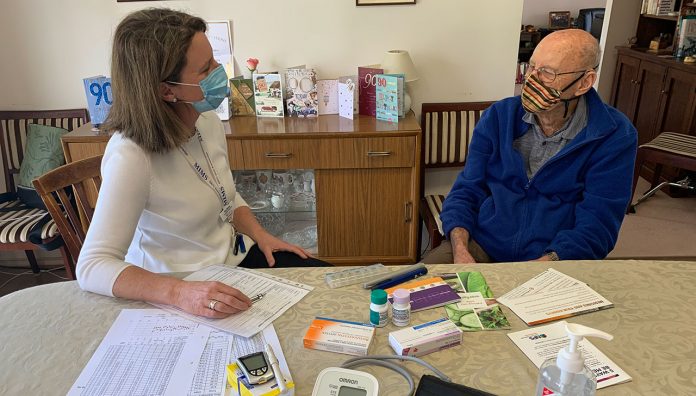Accredited pharmacist Kay Morey MPS has been in the thick of the COVID-19 crisis, providing medication reviews to 21 residential aged care facilities (RACFs) in Victoria, including 18 in metropolitan Melbourne.
Two of these facilities have had COVID-19 outbreaks. Here, she shares her experience of the past 7 months.
February
My team and I are performing Medication Advisory Committee (MAC) meetings at most RACFs, and about 40 onsite Residential Medication Management Reviews (RMMRs) a week, but I’m aware COVID-19 is looming.
My husband is an intensive care paramedic with increased exposure risk and, with three adult children doing tertiary study, we consider the potential impacts. Would he go into hotel isolation if infected? We decide we would prefer him to isolate at home and cope with the impact together.
March
COVID-19 preparation begins among colleagues.
With an eye on what’s to come, we ask more RACFs to enable remote access to progress notes plus medication charts, medical summary, pathology and hospital admissions. It doesn’t entirely reduce the need for care staff to fax documents though, something that will prove impossible given their time constraints in the coming months, and directly impact on residents.
April
We send an urgent alert to all RACFs on the use of nebulisers during COVID-19, as no direction has come from either state or Commonwealth governments. Staff need to ask doctors to switch residents to metered-dose inhalers plus spacers because of the ability of nebulisers to spread droplets up to 8 metres.
Six of our RACFs lock down, but we’re still allowed to access files and drug charts after strict screening upon entry, because we’re classed as essential workers. This access changes within 24 hours if a staff member reports COVID-19 positive. A day at a time from now on!
My elderly father has a chronic wound and his GP has asked that I do all the dressings to minimise his exposure. I feel anxious about the possibility that he could be infected by me.
May
About 70% of our MAC meetings are now on Zoom. Quality Use of Medicines education sessions are cancelled because of social distancing, so we start producing extra factsheets to help.
Requests for Home Medicine Reviews (HMRs) from GPs, who are concerned about their patients with chronic conditions and multiple medicines, start to flood in. We’re also invited to take part in case conferencing via Zoom with a regional GP, a visiting geriatrician and nursing staff from one RACF. This increased cooperation is one plus to come out of the pandemic.
June
The Pharmacy Programs Administrator announces that each RMMR from the following day needs separate patient consent. We must rely on nursing staff to obtain it and RMMR work is basically halted for a fortnight. The stress that care staff are under means some residents will not get an RMMR, as not all have a next-of-kin whom we can contact.
We’re still performing HMRs with patients who are agreeable, but now it’s masks for everyone, social distancing and hand sanitiser.
July
One of our RACFs has a major outbreak and four more have a staff member test positive. We’re doing an onsite visit when we learn of one of these cases and the home is locked down immediately. Fortunately, we have not been in contact with the staff member. This will turn out to be our last visit to a RACF.
RACFs query us about the use of low-flow oxygen and we consult Ambulance Victoria. They advise use with a mask over the top.
August
Stage 4 lockdown. We feel distressed as we hear of a major outbreak in another RACF. Of our 21 homes, at least 13 have had a staff member test positive during this time. Two have had major outbreaks and deaths as a result.
Our workflow has now slowed to 50% of capacity. Communicating with RACFs is becoming increasingly difficult. Our regular contacts may be in isolation or have left their job altogether. This creates another barrier to our ability to work remotely.
We’re also concerned about possible increased use of antipsychotics to settle agitated patients, as we hear there is an increase in fall-related injuries reporting at hospitals.
My husband takes 4 weeks of long service leave that enables me to relax a bit regarding his potential exposure. I decide to take a week off, apart from supporting my other pharmacists’ work and attending Zoom MAC meetings.
It is time for some self-care to recharge. Zoom catch ups with colleagues and family support in my ‘working at home bubble’ have been a lifeline.



 Professor Margie Danchin[/caption]
Professor Margie Danchin[/caption]

 Dr Peter Tenni[/caption]
Dr Peter Tenni[/caption]
 How should we deprescribe gabapentinoids, according to the Maudsley Deprescribing Guidelines[/caption]
How should we deprescribe gabapentinoids, according to the Maudsley Deprescribing Guidelines[/caption]



 Pharmacists have always prescribed, but they have the potential to prescribe much more
Pharmacists have always prescribed, but they have the potential to prescribe much more




